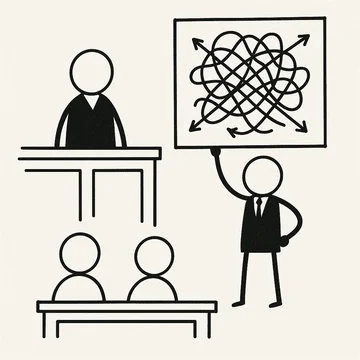As a lawyer I am a creature of rules. Bound in a cage of local rules, standing orders and conventions, I sometimes struggle to see the possibilities that lay beyond. What might be seized if we broke those bonds?

It turns out, nothing good.
Few cases illustrate this lesson better than Bausch & Lomb Inc. v. SBH Holdings LLC C.A. No. 20-1463-GBW-CJB (D. Del Mar. 20, 2023) (Oral Order). Earlier this month (following a bit of a trend in the district), Judge Burke issued an oral order requiring the defendant to clarify its claim construction positions:
The Court, having reviewed the parties' Joint Claim Construction Chart ("JCCC"), hereby ORDERS that by no later than March 15, 2023, Defendant shall submit to Plaintiff its proposed constructions for "comprising on a daily dosage basis" and "administering a daily dosage" (as opposed to statements about when infringement occurs, which is what is currently included in the JCCC)
Bausch & Lomb Inc. v. SBH Holdings LLC C.A. No. 20-1463-GBW-CJB (D. Del Mar. 29, 2023) (Oral Order).
If you're curious, the proposed constructions were "[a]ny direct infringement can only occur when a customer ingests the described dose" and "Direct infringement occurs only when dosage taken by customer." Obviously, this would have come as a bit of a blow to the defendant—no one wants to redo their carefully considered claim constructions—but it probably should not have come as a huge surprise.
As it happened, the day for the defendant to submit its new constructions came and went with no new constructions proposed. Plaintiff followed up with a letter to the Court which attached an email from the defendant saying they "stand by [their] proposed language and had and have nothing to add." Judge Burke ordered the defendant to respond.
In that response, the defendant candidly admitted that it had not submitted the required new constructions. It went on to argue that the originally proposed constructions were fine (and presumably dandy):
. . . defendant submits its submitted construction is proper.
. . . [about a page of argument about the purpose of claim construction] . . .
Thus, defendant respectfully submits its proposal was proper. See Pierce v.Underwood,
487 U.S. 552, 561-62(1988) ("Many questions that arise in litigation are not amenable to regulation by rule because they involve multifarious, fleeting, special, narrow facts that utterly resist generalization."[)]
Id., D.I. 60.
This did not go well. The very next business day Judge Burke struck the defendant's proposed constructions and forbade it from offering new ones.
. . . . In its responsive letter, Defendant did not provide a sufficient explanation for its failure to comply with the March oral order . . . Therefore, Defendant's proposed constructions for the claim terms at issue in the JCCC are hereby STRICKEN. Defendant may not propose new constructions for the claim terms at issue . . . That said, the Court declines to immediately adopt Plaintiffs' constructions for the claim terms at issue right now (as Plaintiffs suggested the Court should). The goal of the claim construction process is to get to the right answer (after engaging in meaningful analysis) regarding the scope of disputed claim terms. In their opening claim construction brief, Plaintiffs should address why their proposed constructions are correct for the claim terms at issue. Defendant may respond to Plaintiffs' arguments in that regard in its answering claim construction brief.; and Defendant should be mindful that failure to comply with Court orders is the type of conduct that may be considered if the Court is later asked to determine if this is an exceptional case under 35 U.S.C. § 285, or whether other similar sanctions should be considered in the case.
The one saving grace for the defendant is that the Court did not adopt the plaintiffs' proposals outright, although it's difficult to see how the defendant can brief the issue effectively without proposing its own constructions.
One final question you might be curious about (I was) -- what brave soul wrote that letter saying they weren't planning to submit any new constructions? Unsurprisingly, outside counsel for the defendant signed the letter, rather than the Delaware counsel. The Court did not comment on this particular issue.
If you enjoyed this post, consider subscribing to receive free e-mail updates about new posts.






